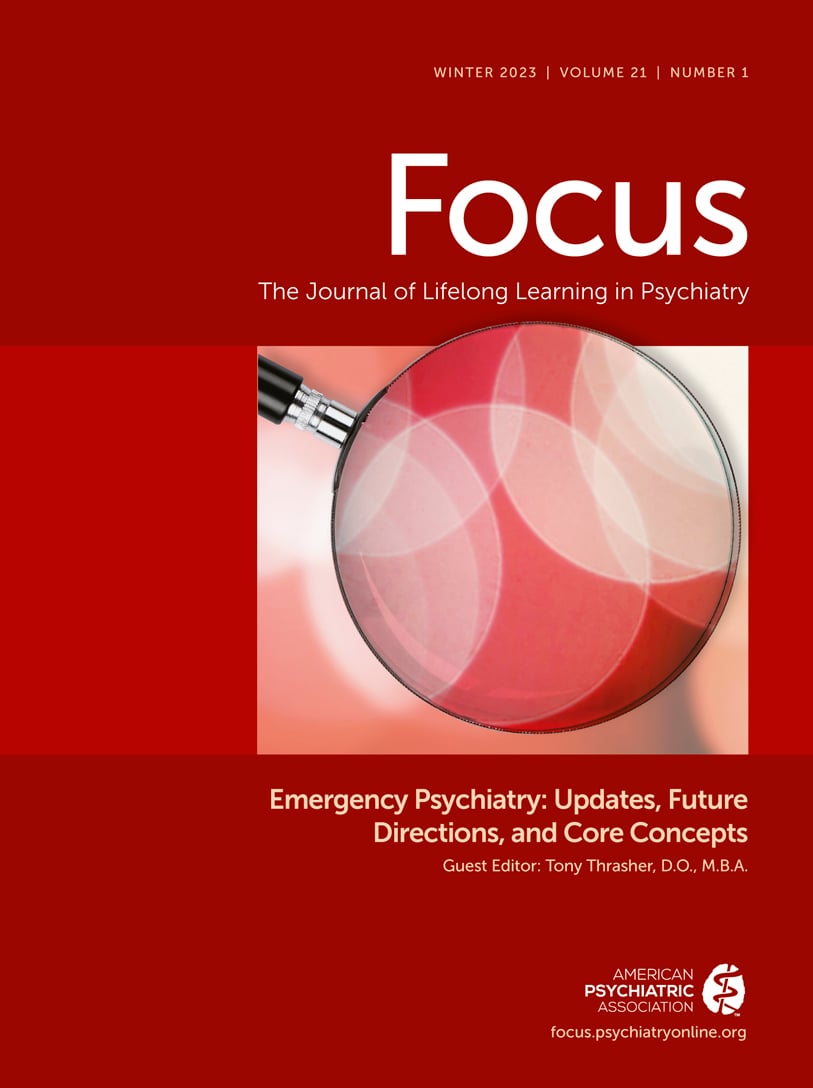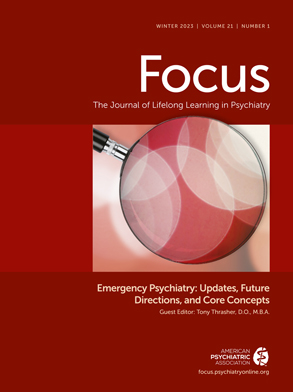The growth of emergency psychiatry as a field has exponentially increased over the past five decades (
1), and it has never been as germane to the well-being of patients as it is now at current state.
Emergency psychiatry is a fascinating field that affects patients in a myriad of venues across the globe. You will see the work of emergency psychiatrists in hospitals, emergency departments, free-standing psychiatric emergency service locations, ambulatory clinics, crisis stabilization units, EmPATH units, mobile teams, crisis intervention programs, consult-liaison services, and the community at large (
2).
Regardless of where this field may be located, the positive effect on patient care is noted in terms of skill set, collaboration, and engagement with patients at times of highest complexity and vulnerability.
This issue of
Focus will note a wide degree of areas in which subject matter expertise can be seen in the emergency psychiatric field. For example, the maintenance of a strong fund of knowledge in all medical areas is key for the psychiatric physician (as noted in Wilson et al.’s article, “Contemporary Practices for Medical Evaluation of the Psychiatric Patient in the Emergency Department”). Additionally, there will be best practices that report on the evaluation of suicide and how to maximize this during patient interviews. Subsequent articles will also discuss optimal ways to investigate for violence as well as ways to treat the emergent symptom of agitation in the patient’s time of need. Further focus will be given to the overlay between this field and the legal system, including updates on risk assessment, management, and mitigation. Last, there will be discussion on the overall continuum of emergency psychiatry care. This discussion notes how crises are being handled not only in traditional hospital milieus but also how they are transitioning into the community care sector. This topic becomes paramount when noting the current stage of medical care intersecting with the community at large under the implementation of the three-digit 988 call line (
3).
Aside from the educational value of the previously noted skill sets, the practice of emergency psychiatry allows physicians to best maximize their collaboration with a myriad of stakeholders. These stakeholders include, but are not limited to, emergency medicine physicians, mental health advocates, policy makers, elected officials, paramedics, family members, community leaders, and law enforcement.
When considering the aforementioned growth in skills and collaboration, one can see how this manifests as better engagement with our mission and those who psychiatric physicians serve. At the physician level, this emergency core training leads to improvements in the psychiatric interview by better integrating medical knowledge, risk assessment, and time management (
4). At the peer medical professional level, it allows for leadership of multidisciplinary efforts while also exploring the synergy of working with community leaders on advancements in care tied to access (and quality of that access).
The core concepts of the emergency psychiatric field are those that benefit all psychiatric physicians. The handling of risk mitigation, violence prevention, care of vulnerable populations, interviewing nuances, and complex medicolegal scenarios are those faced by everyone. Hence, it has been an aim of the American Association for Emergency Psychiatry (as well as partner organizations like the Coalition on Psychiatric Emergencies) to grow this field and not only provide subject matter expertise but also note how these skills extrapolate to physician and patient benefit, regardless of practice location!
When examining future state, it is immensely exciting and encouraging to see the growth of emergency psychiatric care at both hospital and prehospital locations. Although the benefit of this field is already noted in the hospital domain, there is equal amount of impact seen for our patients further downstream.
In hospital settings, these principles increase engagement, decrease boarding, enhance safety planning, and decrease coercive items such as restraints and seclusion. As more patients are treated in community settings, we also see massive benefits with improving timely access to care and adherence to the principles of trauma-informed processing and psychological first aid (
5). This includes utilizing current models of care as well as being inspired by other newer modalities such as the Crisis Now model or EmPATH units.
Emergency psychiatry has also been fortunate enough to be placed at the intersection of many important public health, social justice, and patient rights issues in the past decade. This is an immense responsibility and one that the field of emergency psychiatry is honored to take part in. The ability to work with fellow physicians as well as other medical professionals, policy makers, and law enforcement leaders (
6) is an ongoing project that emergency psychiatrists are uniquely prepared to assist, lead, and provide ongoing care to our patients in the transitions therein.

